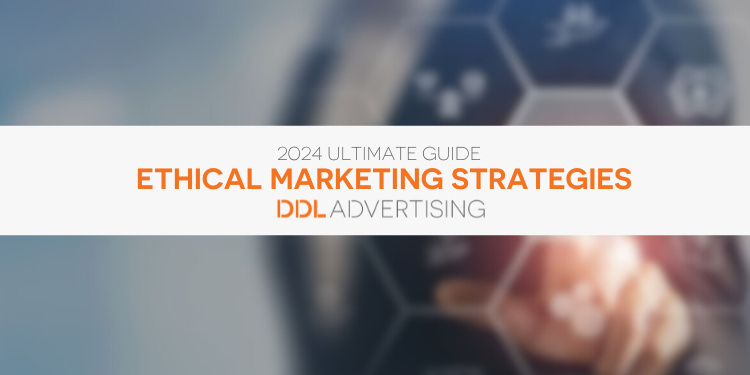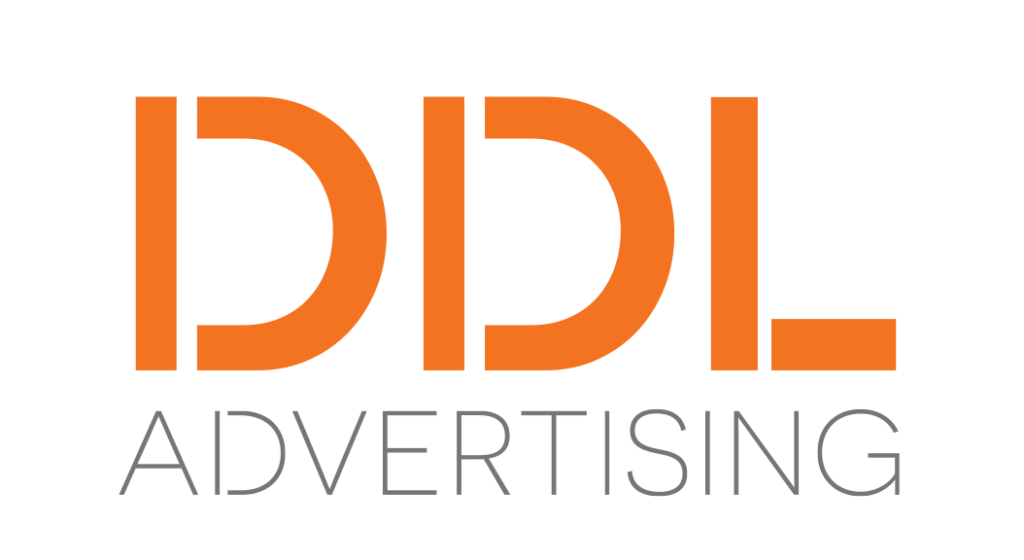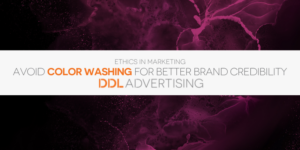

Overview.
Remember your Level 200 or 300 marketing classes in college? They usually had some drawn-out names like TV, Communication and Culture, or Profitability Research Methods. They were generally stuffy, where no one spoke up, and the professor would drone on in the most Ben Stein (sorry, Ben) monotone you’ve ever heard. Well, there was one class most of us had to take that admittedly had the same feeling but is now more relevant today than ever. That class is Business Ethics.
No longer a pass/fail class in the real world, business & marketing ethics lays the foundation for successful companies and organizations. We feel it’s important to talk a little about what they are, how commitment to your ethics affects your business, and how continued advocacy for initiatives like DEI and ESG impacts your business. We’ll also share some of the ethical standards DDL holds, and we encourage you all to share yours with us! So, before you fall asleep at your desk, Let’s get into it.
What are Business Ethics, & why do you Need them?
To quote Harvard Business School (and to continue the college class motif), business ethics are “principles that guide decision making.” Generally, we conflate the idea of ethics with being morally “correct or just.” Ethics do not always have to search for correctness or truth, but in the business world, having ethics that don’t prioritize a positive relationship with customers or audiences, usually isn’t profitable.
Some of the most universally accepted business ethics are Honesty, Transparency, and Responsibility. Conveniently, those are DDL’s core ethical tenets.
A commitment to honesty ensures that we foster mutually beneficial relationships with our clients while providing the highest quality product. Sometimes honesty may include being direct with clients about their take on creative or advice about their marketing tactics. Honesty is also critical if your brand or business exists in an online capacity. The internet does not forget and is QUICK to call out a business for being dishonest should a damaging tweet or crisis communication appear less than transparent.
Speaking of, transparency in a digitally connected world is paramount. Remember those internet sleuths from two sentences ago? Well, they love nothing more than exposing companies for being anything less than crystal clear. The Volkswagen Diesel scandal is a prime example of ethical failure in transparency. More recently, it was discovered that Amazon’s “Just walk out” contact-free grocery shopping method may rely on hundreds of Indian employees to monitor what customers are purchasing rather than AI technology, as the program initially claimed. While various sources have reported this, Amazon has not directly revealed how the software processes what’s in your cart.
This lack of transparency may raise questions about the treatment of these workers and how clear Amazon is about collecting your information.
At DDL, we prioritize transparency with our clients and with our employees. Establishing clear expectations for our team and happily reviewing any gray areas in media plans or strategy with our clients builds trust. And without trust, good marketing can not happen.
The final major ethical tennant DDL follows is responsibility. This applies to employees, clients, and the community. Loosely adapted from the triple bottom line theory, we follow responsible practices that foster growth and profit, strong relationships with employees and clients, and prioritize giving back to our communities.
We see ethical responsibility manifest in some of our clients.
Season’s Corner Market hosts an annual 5k race, Angels Giving Back, where all net proceeds are donated to the Tomorrow Fund, The PKD Foundation, and the Alzheimer’s Association.
Paul Masse continuously gives back to their community by supporting local high school students & athletes and the Rhode Island Food Bank.
The Good Shark works with the Atlantic White Shark Conservancy to help preserve White Shark populations.
Honesty, transparency, and responsibility are only three ethical tenants essential to a successful business. What are yours? Share some of yours with us, and we could feature them later this month!
With a better understanding of ethics, let’s explore how these ethics commitments affect your business.
How Commitment to Ethics affects your Business:
We’ve already seen a few examples of how adherence to or deviation from your ethical standards can affect your business.
To topline (because we know y’all love some marketing buzzwords), following your business ethics during a difficult situation will win customer praise and perpetuate consumer loyalty.
 For example, in 1982, Tylenol capsules laced with potassium cyanide killed several people. The company responded immediately by destroying and recalling all products and redistributing new medication. A year later, the company’s reputation had soared, demand reached above pre-incident levels, and the company was praised for its ethical response to the problem.
For example, in 1982, Tylenol capsules laced with potassium cyanide killed several people. The company responded immediately by destroying and recalling all products and redistributing new medication. A year later, the company’s reputation had soared, demand reached above pre-incident levels, and the company was praised for its ethical response to the problem.
Conversely, the current crypto fiasco involving entrepreneur Sam Bankman-Fried is as close as a textbook case of total ethical failure can get.
Sam Bankman-Fried, or the “King of Crypto,” was CEO of the FTX cryptocurrency exchange, worth $32 billion at its peak. After a series of red flags, including mishandling investor funds, fraud, money laundering, and exchanging sensitive information via Snapchat, the company went bankrupt, costing investors their capital.
Bankman-Fried was found guilty of lying to investors and stealing billions from his company. On March 28, 2024, he was sentenced to 25 years in prison and paid $11 billion in forfeiture.
Okay, these high-profile cases may not reflect what adhering to your business ethics looks like on a smaller scale. We can jump into that, too.
For small to midsize businesses, especially those prioritizing the Millennial and Gen Z demographics, your commitment to ethics differentiates between a sale or some nasty tweets. Research has shown that Millennials would TAKE A PAY CUT to work for a company that prioritized social responsibility and SPEND MORE with companies that act on causes like DEI and ESG (we’ll get to those next)
If you’re scratching your head thinking about why this is, Millennials, and by extension, Gen Z, came of age during the ENRON scandal, the BP oil spills, and arguably at the serge of consumer convenience. As they’ve grown up, climate science, recession, and continued foreign affairs instability have created a mindset of perpetual existential crises. Therefore if one of these consumers can make a difference in the way of providing toilets to countries without sufficient water systems by purchasing from who gives a crap or helping people gain access to mental health services by purchasing from Toms, they absolutely will.
How DEI and ESG Affect Business ethics what to be cautious about:
In the months following renewed efforts for social justice in 2020, many companies began adopting new acronyms and shifting their public language to become more inclusive. The two biggest causes were DE&I, Diversity Equity and Inclusion, and ESG, or Environmental Social Governance.
dei
Focusing on people, DEI initiatives work to give historically marginalized groups a seat at the table. True DEI does not advocate for the replacement of dominant groups; rather, it works to uplift the suppressed to a place for equity. It’s important to note that “equity” and “equality” are different. DEI strives to perpetuate the notion of all groups having the resources needed to be given equal chances of success. Equality embodies the idea that everyone should be given the same resources. In theory, this sounds great, but in practice, it creates a more significant gap between majority and minority groups. We’ve included this helpful graphic to help visualize the concept of equity vs. equality.
When committing to DEI efforts in a business, it’s essential to do so genuinely. These efforts can be complex and may require the unlearning of practices and principles understood when the cultural norms are different. Positive examples of DEI work include creating workshops or opportunities within an organization to allow culturally diverse groups to share their workplace experiences to bring understanding to all team members. When communicating DEI concepts externally, avoid things like rainbow washing (a practice that disingenuously supports the queer community via feigned engagement) or brownwashing (similar to rainbow washing but towards BIPOC communities). Additionally, there is the concept of the pink tax, which unfairly inflates the costs of products targeted at women, typically in the health and beauty space.
ESG
Environmental Social Governance is similar to DEI but focuses more on companies’ environmental impact on the planet. Fossil fuel, fast fashion, and food service companies are at the forefront of these conversations as their products critically affect the environment. On a local and regional level, examples of positive ESG include companies working to offset their carbon footprint. This is achieved by working remote days, implementing sustainability initiatives in product development, or working to reduce the amount of power a company draws from fossil fuels. For some companies, this could mean working to become a certified B Corp business, which rewards companies for prioritizing sustainability. The most notably negative ESG examples are practices known as greenwashing. These are false claims companies may make about their products regarding sustainability.
Choosing your Ethical Principles:
We’ve covered a lot. We’ve discussed business ethics and how to weave them into your business. We’ve talked about how your ethics impact your business, and we’ve shared some relatively new concepts in business ethics and how they manifest in your marketing.
We still want to hear from you! There’s a lot to digest here, and we love a good conversation, so share with us. Tell us how you manage your business ethics. What works well, and what is still challenging? At the end of the day, we are business people just like you, doing the best we can to do the next right thing. Hearing from all sorts of businesses can help those just starting or those amid a rebrand find their guiding principles. Each vertical and sector has its own, but the free conversation about ethics empowers us to continue to be better versions of ourselves.







